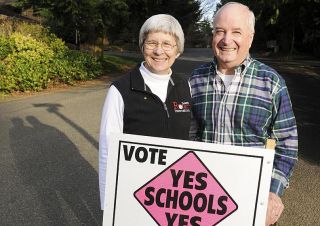Islanders stick out their necks to make a better world
Nancy Gould-Hilliard
Mercer Island Reporter
The sign outside of Rand and Judy Ginn’s house reads, “Support Mercer Island Schools.” Leftover campaign signs in their garage show past support for local candidates. Boxes in their basement are being packed for a fundraising auction, and a stockpile of dictionaries will soon be distributed to school children.
Attesting to the couple’s conservation bent, two hybrid vehicles are parked in the driveway, raised vegetable beds are about to be planted, and solar panels on the roof are aided by a geo-thermal heat pump.
As the front door opens to their architecturally elegant home, a tiny squeaking comes from beyond. It’s the voice of 2-month-old infant Estella, who the Ginns are babysitting so that her mom — Judy’s first student teacher — can now teach. Judy has just returned from an International District Rotary Board meeting.
This is their Valentine’s Day, which barely scratches the surface of the Ginns’ socially concerned lives. Rand and Judy not only take on the political, religious, educational and volunteer jobs of their community, but they jump in whenever needs arise just to get things done — for instance, the Ten Thousand Villages sale of international goods to get fair market prices for third-world artisans … their help to bring the African Children’s Choir to MI … Habitat for Humanity gigs … sorting food donations at First Harvest. Judy just joined the local Children’s Hospital Guild that sponsors the Mercer Island Directory “because I don’t want us to lose the directory,” she said.
The couple joined International Fellowship of Skiing Rotarians for trips to other countries every two years for fun, which also supports the adaptive outdoor program to teach people with handicaps how to ski. They serve lunches in the summer to central-area schools. Rand was an interim School Board director in 2001 and is on call to drive buses for Covenant Shores seniors. They take part in community cleanups, “Solemate” walks (Judy) and Men’s Total Workout (Rand) at the community center.
As birth parents of Katie and Bill, and adoptive parents of Andrew, from Korea, the Ginns were immersed in PTAs, lobbying for a mandatory seatbelt law, soccer coaching, children’s choirs and all that goes into parenting. When the children fledged, Judy said that she was depressed and felt like a “leach on society. I knew we had a good life, home, garden and all sorts of ‘me-activities,’ but I wasn’t contributing enough to the common good.”
Judy’s fight for the underdog was highly influenced by her mother’s example as one of the first Head Start teachers in Yakima, who also forged a preschool coalition for migrant workers. “Mom was never afraid to speak up for what was right,” said Judy. Her passion for public education — the backbone of democracy, she believes — led her to teach in inner-city Seattle schools for 15 years.
Judy is adamant about public education: “Fair isn’t equal. Quality education needs to be apportioned more to those in poverty. Their socio-economic and learning challenges put them behind when they arrive at school. Sometimes they don’t even speak English. The assumption of the WASL is wrong — all children are not at the same starting line and cannot achieve or meet standards lock step.”
She believes kids with greater challenges need more community childcare before and after school; that recesses, art, specialized activities and play should be integrated back into their school day. More emphatically, she thinks year-round school would help kids’ learning and optimize the use of facilities.
“Districts that have adopted year-round school attest to its benefits,” said Judy. “With nine weeks on and three weeks off, and the longest break being six weeks, kids don’t as easily forget what they’ve learned. They — and the providers — enjoy a healthier rhythm of learning and living, and still get 180 contact days.”
Rand is the quieter of the pair, the one who Judy calls “the steady, practical problem solver” in contrast to her “let’s-do-it” persona.
“She puts us out there more, and I love it,” he admits. Both appreciate each other’s capable and competent ways, and, in their 41 years of marriage, see their responsibility as “helping one another be the best person possible.”
Rand has done similarly in his profession as an investor in small businesses. He has supported friends’ propositions in the same can-do manner: Northern Life Tower, Tiki Car Washes, Sturtevant’s Ski Shop, Omega Photo, Philson Clothing, Sigma Color Printing, O’Brien Water Skis, Alaska Fish Fertilizer and radio stations, among others.
The couple does not seek recognition for their deeds. Community involvement is their fun. “Leisure doesn’t help find meaning in life,” said Judy, now retired from teaching. She believes in Mother Teresa’s philosophy that “perhaps we cannot do great things. We can only do small things with great love.”
They next plan to help with the Rotary Half Marathon on March 9. They like feeling “plugged in.” Besides, said Rand, “Community work makes you feel real good.”



